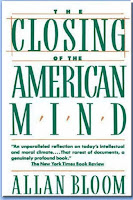I have been recommending to friends and netizens for years now two excellent books on economics by Hernando de Soto, viz., The Mystery of Capital and The Other Path. Both of these books focus primarily on the impact real property rights have on freeing up capital and wealth in third-world countries. Richard Curtis (Girl in the Cafe) might want to read one of these tomes before he lectures the West again on simply writing checks to these ravaged countries.
Recently, I had a conversation with a national talk-show host and his guest from the American Enterprise Institute, and reminded him on the air that when Reagan was lecturing Gorby at the Brandenburg Gate in Berlin to "tear down this wall" two years before it did fall, there were Vaclav Havel's and Solzhenitsyn's and others who were ready to pick up the mantle of freedom and democratic leadership once their countries were freed from their shackles of tyranny. We don't have that now in Egypt. I am not suggesting a paternalistic approach in Egypt, just a fundamental focus on what matters during this transition for the Egyptian peoples (the 97% of whom are not in Tahrir Square!) early on, e.g., the primacy of property rights.
I also expressed my disappointment with President Obama (No. 44) and the missed opportunity regarding his speech in Cairo (University of) in 2009 where Obama could have called out (politely, in his inimitable fashion) the ruling oligarchs in the middle east (i.e., billionaire despots) who are sitting on stacks and stacks of blackened, oil-slicked cash, to recognize officially the underground economies that are worth hundreds of billions of dollars. Who better than our President to reach across the Persian rug aisle to the skeptical and tribal (sectarian?) leadership of the Middle-East? If only ... What we got instead was pablum and banal talk of past greatness to placate his audience. No one was challenged. No leadership awkwardly called to the carpet in front of the world. A mere two years later (a timespan ironically similar to Reagan's post-Brandenburg Gate speech), Egypt is changed forever and US statecraft under this administration was revealed to be sorely lacking and feckless ... again.
Nature and tyrants abhor a vacuum. And, when this wide-body kleptocracy of Mubarak exits the Sinai Peninsula, I fear we will have radicals entering the vacated public square ready to bring new direction and dictates to the masses that do not have the rights of man at the fore of their agendas. I'm afraid that radicalism will replace corruption, and then the West will have both to contend with.
Mr. de Soto in his WSJ editorial discusses the radical transformation possible in Egypt IF a fundamental shift in socio-economic policies is encouraged and implemented. I post (in part) here for you:
By HERNANDO DE SOTO 3 Feb 2011
After years of fieldwork and analysis—involving over 120 Egyptian and Peruvian technicians with the participation of 300 local leaders and interviews with thousands of ordinary people—we presented a 1,000-page report and a 20-point action plan to the 11-member economic cabinet in 2004. The report was championed by Minister of Finance Muhammad Medhat Hassanein, and the cabinet approved its policy recommendations.
Egypt's major newspaper, Al Ahram, declared that the reforms "would open the doors of history for Egypt." Then, as a result of a cabinet shakeup, Mr. Hassanein was ousted. Hidden forces of the status quo blocked crucial elements of the reforms.
Today, when the streets are filled with so many Egyptians calling for change, it is worth noting some of the key facts uncovered by our investigation and reported in 2004:
• Egypt's underground economy was the nation's biggest employer. The legal private sector employed 6.8 million people and the public sector employed 5.9 million, while 9.6 million people worked in the extralegal sector.
• As far as real estate is concerned, 92% of Egyptians hold their property without normal legal title.
• We estimated the value of all these extralegal businesses and property, rural as well as urban, to be $248 billion—30 times greater than the market value of the companies registered on the Cairo Stock Exchange and 55 times greater than the value of foreign direct investment in Egypt since Napoleon invaded—including the financing of the Suez Canal and the Aswan Dam. (Those same extralegal assets would be worth more than $400 billion in today's dollars.)
The entrepreneurs who operate outside the legal system are held back. They do not have access to the business organizational forms (partnerships, joint stock companies, corporations, etc.) that would enable them to grow the way legal enterprises do. Because such enterprises are not tied to standard contractual and enforcement rules, outsiders cannot trust that their owners can be held to their promises or contracts. This makes it difficult or impossible to employ the best technicians and professional managers—and the owners of these businesses cannot issue bonds or IOUs to obtain credit.
Nor can such enterprises benefit from the economies of scale available to those who can operate in the entire Egyptian market. The owners of extralegal enterprises are limited to employing their kin to produce for confined circles of customers.
Read the rest of his excellent piece here in the WSJ. What are your thoughts?











































